The latest entrant into the fast-crowding field of new-age education products and services is the Mumbai-based Mexus Education Pvt. Ltd (estb. 2008) which dramatically announced its entry into Indian education by becoming the first education services company to co-sponsor a team (Deccan Chargers) in the recent blockbuster IPL 2010 cricket tournament. Dilip Thakore reports
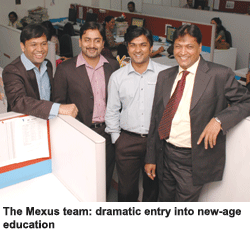 Although officially the country is still debating the role of private sector entrepreneurs in Indian education by mooting half-way houses such as public-private partnerships, across the country, unmindful of the ideological debate, a new generation of go-getting education entrepreneurs (‘eduprenuers’) is multiplying in the wide open spaces of India’s government-dominated education sector.
Although officially the country is still debating the role of private sector entrepreneurs in Indian education by mooting half-way houses such as public-private partnerships, across the country, unmindful of the ideological debate, a new generation of go-getting education entrepreneurs (‘eduprenuers’) is multiplying in the wide open spaces of India’s government-dominated education sector.
In particular during the past decade, following signing of the Millennium Development Goals Declaration — which includes primary education for all by the year 2015 — by 192 member nations (including India) of the United Nations Organisation in September, 2000, awareness that high-quality, utilitarian education is the passport out of the pervasive poverty and deprivation that over 80 percent of the country’s households are heir to, has filtered into the meanest home and hearth countrywide. This new awareness of the bankable value of quality education is the driving force behind the promotion of a rapidly growing number of private sector education products and services companies, as well as slum and village primaries to international schools and private universities across the subcontinent.
Consequently despite Central and state government disincentives, corr-uption and red tape, aided and enabled by intelligent legal advice and driven by pressing demand for meaningful, utilitarian education, several pioneer education-focused corporates have entered the awaking education sector, and are providing a slew of teaching-learning products and services to pre-schools, primaries and secondaries, all the way up the chain to coaching institutes, colleges and universities. Among them: Everonn Education, NIIT, Educomp Solutions, Helix Technologies, Manipal K-12 and iDiscoveri — some of whom have emerged as blue-chips of the stock exchanges — which have struck deep roots in receptive soil, and are delivering an unprecedented range of ICT (information communication technologies) services, curriculums, contemporary pedagogies and a plethora of supplementary learning programmes to a multiplying number of private and government education institutions across the country.
The latest entrant into this fast-crowding field of new-age education products and services is the Mumbai-based Mexus Education Pvt. Ltd (ME, estb. 2008) which dramatically annou-nced its entry into Indian education by becoming the first education services corporate to co-sponsor an IPL (Indian Premier League) team in the recently concluded IPL 2010 cricket tournament. ME’s distinctive corporate logo on the headgear of the Deccan Chargers team, which won the title last year (2009), was visible loud and clear to the estimated 40 million cricket-crazy fans who followed the tournament. According to reliable sources, ME paid a massive sum of Rs.2.5 crore for the privilege which announced the company’s debut as a heavyweight contender in the world’s potentially largest market for education products and services.
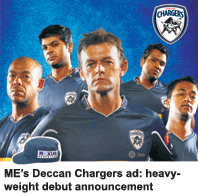 Knowledgeable monitors of India’s booming market for education products and services — estimated at US $40 billion (Rs.184,000 crore) by the Hong Kong-based research transnational firm CLSA Pacific and growing at 15 percent per year — are unsurprised by the entry of ME into the K-12 education segment. Because the driving spirit behind ME is the low-profile but deep-pocketed Vapi (Gujarat)-based Bilakhia Group (estimated annual revenue: Rs.500 crore), a big name in printed inks, resins, adhesives, wire enamels, agrochemical and life science industries with a reputation for seriousness of purpose and intent.
Knowledgeable monitors of India’s booming market for education products and services — estimated at US $40 billion (Rs.184,000 crore) by the Hong Kong-based research transnational firm CLSA Pacific and growing at 15 percent per year — are unsurprised by the entry of ME into the K-12 education segment. Because the driving spirit behind ME is the low-profile but deep-pocketed Vapi (Gujarat)-based Bilakhia Group (estimated annual revenue: Rs.500 crore), a big name in printed inks, resins, adhesives, wire enamels, agrochemical and life science industries with a reputation for seriousness of purpose and intent.
According to ME sources, during the past two years since it purchased a (undisclosed) majority stake in Aakar Knowledge Solutions Pvt. Ltd (as ME was then known) — promoted by three maverick IIT-Bombay engineering graduates — the brothers Anjum, Younis and Sayed Bilakhia have pumped Rs.50 crore to develop the new age products and services required urgently by the country’s 1.8 million moribund primary and secondary schools. Moreover displaying unusual project, people and risk assessment skills, the Bilakhia brothers have devolved management of the newly promoted Mexus Education Pvt. Ltd wholly upon the highly-driven and motivated IIT-Bombay graduates Rohit Jain, Suarabh Saxena and Kunal Sharma (average age: 28 years), who promoted Aakar Knowledge Solutions (later renamed Axiom Education) in 2008.
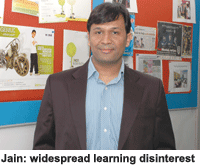 “Mexus Education is an education innovations enterprise registered in 2008 with a mission to reinvent K-12 education. This education systems, products and services company was born out of our conviction that there is widespread student disinterest in learning, because of the disconnect between school education and real life. Therefore after thorough and rigorous investigation, analysis and research of K-12 education in India, we have developed our Iken School Ecosystem which opens up multiple learning pathways to knowledge assimilation in schools, and several other products and services which enable parallel and continuous learning in pursuance of our core belief that teaching-learning should not be confined to classroom walls,” says Rohit Jain (27), a metallurgy engineering graduate of IIT-Bombay who signed up with IBM Global Services after graduation in 2004, but quit a year later to team up with like-minded IIT-B contemporaries — Kunal Sharma and Saurabh Saxena — to promote Aakar Knowledge Solutions, a firm conducting teaching-learning workshops and providing teacher training services to primary-secondary schools.
“Mexus Education is an education innovations enterprise registered in 2008 with a mission to reinvent K-12 education. This education systems, products and services company was born out of our conviction that there is widespread student disinterest in learning, because of the disconnect between school education and real life. Therefore after thorough and rigorous investigation, analysis and research of K-12 education in India, we have developed our Iken School Ecosystem which opens up multiple learning pathways to knowledge assimilation in schools, and several other products and services which enable parallel and continuous learning in pursuance of our core belief that teaching-learning should not be confined to classroom walls,” says Rohit Jain (27), a metallurgy engineering graduate of IIT-Bombay who signed up with IBM Global Services after graduation in 2004, but quit a year later to team up with like-minded IIT-B contemporaries — Kunal Sharma and Saurabh Saxena — to promote Aakar Knowledge Solutions, a firm conducting teaching-learning workshops and providing teacher training services to primary-secondary schools.
Although the trio had a clear idea of the missing links and ingredients in primary-secondary education of which they had unfond memories, inevitably they lacked the financial muscle to develop new tech products, content and services to realise their ambition to “reinvent school education in India”. Fortunately, their detailed business plan to develop the end-to-end Iken school ecosystem, a combination of graphic textbooks, digital technology, content, teacher development, peer learning, toys, games and experimental kits, ERP (enterprise resource planning) and back-up consultancy and support services, attracted the attention of the Bhilakhia Group.
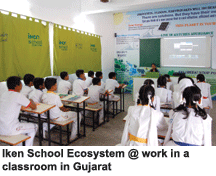 With their experience of supporting 1,500 primary and secondary schools across the western sea-board state of Gujarat (pop. 55 million) and of the printing inks business, the Bilakhias were well aware of the infirmities — especially the poor learning outcomes — of the school system. Therefore they were sufficiently impressed by the rigorous analytical skills, zeal and business plan of the IIT-B trio, who had all forsaken highly-remunerative jobs to contribute towards development of primary-secondary education. In early 2008, they purchased a majority but undisclosed equity stake in Axiom Education which morphed into Mexus Education Pvt. Ltd last October (2009). “We want every child in India — urban or rural — to benefit from the India growth story. For that, we want to create a meaningful, self-learning education model that remains with the child forever. I’m confident that Mexus Education will make every effort to develop learning systems to reach every child in India in her own language,” says Zakir Bilakhia, chairman of the Bilakhia Group.
With their experience of supporting 1,500 primary and secondary schools across the western sea-board state of Gujarat (pop. 55 million) and of the printing inks business, the Bilakhias were well aware of the infirmities — especially the poor learning outcomes — of the school system. Therefore they were sufficiently impressed by the rigorous analytical skills, zeal and business plan of the IIT-B trio, who had all forsaken highly-remunerative jobs to contribute towards development of primary-secondary education. In early 2008, they purchased a majority but undisclosed equity stake in Axiom Education which morphed into Mexus Education Pvt. Ltd last October (2009). “We want every child in India — urban or rural — to benefit from the India growth story. For that, we want to create a meaningful, self-learning education model that remains with the child forever. I’m confident that Mexus Education will make every effort to develop learning systems to reach every child in India in her own language,” says Zakir Bilakhia, chairman of the Bilakhia Group.
The first initiative of the IIT-B trio, who were given free rein to implement their product and services development ideas, was to establish a state-of-the-art Mexus Innovation Centre on the sprawling 20-acre industrial hub of the Bilakhia Group in Vapi, with an expenditure outlay of Rs.5 crore. Following a nationwide head-hunting operation, a core team of highly talented and experienced product and content designers was recruited for the centre. The core group comprises Mohenish Gupta, an animations industry pioneer, advisor to the Birla Institute of Technology and Sciences (Ranchi), and animations adviser to Hanuman, India’s first 2D animation feature film, who heads the design team; Teena Paul, an IIM-C alumna with over 13 years of K-12 content development experience of several examination boards’ curricula who heads the content team; Anirudh Swarnkar, an IIT-B alumnus who heads the gaming and toys development cell; Ankit Mehta, an IIT-B alumnus who heads the teacher development programmes, among others. Under the supervision of this core team, the headcount in the Mexus Innovation Centre has grown to over 300.
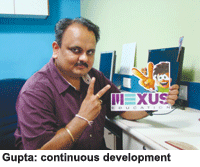 “The purpose of the Mexus Innovation Centre is to constantly develop new content, teaching-learning aids including graphic texts, content enrichment DVDs and educational toys and games for supplementary learning. During the past two years of intensive R&D we have innovated our textbooks-mapped Iken School Ecosystem and Iken Brain gym which offer optional multimedia learning opportunities which are completely unique concepts unmatched by any of our competitors.” says Gupta.
“The purpose of the Mexus Innovation Centre is to constantly develop new content, teaching-learning aids including graphic texts, content enrichment DVDs and educational toys and games for supplementary learning. During the past two years of intensive R&D we have innovated our textbooks-mapped Iken School Ecosystem and Iken Brain gym which offer optional multimedia learning opportunities which are completely unique concepts unmatched by any of our competitors.” says Gupta.
Likewise Teena Paul who supervises the ME content and curriculum development cell defines her job function as exploration of “new media and platforms and development of innovative products that make learning more engrossing and meaningful”. “I believe that ME has been quite successful in this respect. Among our major innovations are a set of touch reading books; touch learning series in differing media and board games that facilitate the learning of geography, biology and maths,” says Paul.
Indeed this two-year-old company’s major achievement which has rapidly transformed it into a heavyweight contender in India’s suddenly energised K-12 education sector is that its R&D professionals have invented a slew of innovative and exciting B2B (business to business) and B2C (business to consumer) products, which are generating great enthusiasm within schools and parental commu-nities countrywide (see box).
In the B2B segment the company’s star products are its Iken School Ecosystem (ICT hardware, content and services) and Iken Braingym activity/learning centres (for learners in the age group three-30). In the B2C space it has innovated its Iken (Graphic) Books, Iken Digital Library (supplementary educa-tion DVDs), Iken Pro (English and soft skills learning DVDs) and Iken Joy (educational toys for children above eight years of age).
According to Saurabh Saxena (28), a metallurgy engineering postgrad of IIT-Bombay and promoter director of ME who began his career with Nishit Desai Law Associates, switched to Halliburton Energy Services in Singapore and Malaysia and currently heads marketing operations of ME, the company’s Rs.50 crore investment in R&D is paying off handsomely. In its very first quarter of commercial operations (Jan-March 2010) ME recorded a sales turnover of Rs.5 crore, and in fiscal 2010-11, a revenue of Rs.60 crore has been budgeted.
.gif) “Through six full quarters upto December 2009, we invested in creating exciting and engaging learning media — graphic texts, films, toys and digital infrastructure for schools and adult learners. This patient strategy has enabled us to refine our products and processes and to quickly reach scale-up stage. Currently our B2B products — the Iken Schools Ecosystem and Iken Braingym — are operational in 40 cities countrywide and our B2C products are available pan-India. In 2010-11 we plan to establish 50 Iken Braingym centres and install the Iken School Ecosystem in 2,000 schools across the country. The benefit to Indian society will be the emergence of students who are deep thinkers, inventors and problem-solvers,” says Saxena.
“Through six full quarters upto December 2009, we invested in creating exciting and engaging learning media — graphic texts, films, toys and digital infrastructure for schools and adult learners. This patient strategy has enabled us to refine our products and processes and to quickly reach scale-up stage. Currently our B2B products — the Iken Schools Ecosystem and Iken Braingym — are operational in 40 cities countrywide and our B2C products are available pan-India. In 2010-11 we plan to establish 50 Iken Braingym centres and install the Iken School Ecosystem in 2,000 schools across the country. The benefit to Indian society will be the emergence of students who are deep thinkers, inventors and problem-solvers,” says Saxena.
Although the top management of Mexus Education believes that through focused R&D they have developed excellent products, processes and services for education institutions, the popular perception is that the company is a late entrant into the burgeoning ICT and digital learning sector. Several heavyweight corporates including Educomp Solutions, Everonn Education, NIIT, and scores of smaller regional companies have already been active in the digital learning marketplace for over a decade, and have installed their ICT learning systems delivered on the BOOT (build, own, operate and transfer) model in over 15,000 of the country’s high-end private schools apart from several thousand government schools.
The ME top brass with its penchant for deep research is well aware of this reality. Nevertheless they believe that the existing ICT and digital learning products and services companies have reached only a small percentile of India’s 1.8 million K-12 schools, including 80,000 high-potential private primary-secondaries. Therefore they reckon there’s room for many more digital learning providers to fulfill the dormant but awakening needs of the world’s largest child population. Secondly, and perhaps more importantly, ME’s youthful, go-getting managers believe that their products and services mix has several “killer apps” which distin-guishes them from other ICT-in-education companies and will nullify their early mover advantages.
A killer app that the company is banking upon, is the Iken School Ecosystem, which maps printed subject textbooks chosen by client schools in every detail. This not only makes explanatory digital teaching easier in the classroom, it also provides a parallel digital refresher course to students. Moreover ME top brass is confident of market acceptability of the company’s B2C Iken range of products which they believe are more student-centric and mutually reinforcing.
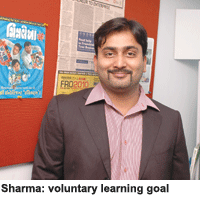 “While uniquely the Iken School Ecosystem follows prescribed texts in every detail, our other products — graphic textbooks, Iken library, Iken Pro DVDs and Iken Joy toys and games — offer students numerous options to supplement and enrich prescribed syllabuses, and learn in truly engaging and enjoyable ways. Our institutional goal is to make the learning process stimulating so that children learn voluntarily and become life-long learners,” says Kunal Sharma, also an IIT-B alum and promoter-director of ME who supervises the content and products development, and post-sales services portfolios.
“While uniquely the Iken School Ecosystem follows prescribed texts in every detail, our other products — graphic textbooks, Iken library, Iken Pro DVDs and Iken Joy toys and games — offer students numerous options to supplement and enrich prescribed syllabuses, and learn in truly engaging and enjoyable ways. Our institutional goal is to make the learning process stimulating so that children learn voluntarily and become life-long learners,” says Kunal Sharma, also an IIT-B alum and promoter-director of ME who supervises the content and products development, and post-sales services portfolios.
Quite patently the growth and development strategy of the three promoter-musketeers of Mexus Educ-ation is to position the company as an end-to-end provider of school education services offering textbooks-mapped learning in the classroom, supplemented with curriculum enriching continuous learning opportunities through its B2C products. And to top off its products/services mix, the company has conceptualised Iken Braingym learning/activity centres (membership price: Rs.1,500-3,000 per month), where pre-school to class XII children can self learn by reading in the library, in computer labs or by playing digital games even as their parents can parallely develop English language, computer learning and soft skills within the same premises. In short the company’s five operational Iken Braingym centres offer learners of all ages multimedia options to enhance comprehension and knowledge of specialisations of their choice.
 Customer feedback indicates that the company’s heavy emphasis on research and product develop-ment and testing prior to entering the marketplace is beginning to pay off. “We have installed the Iken School Ecosystem in our high and higher secondary schools. Since the system is complex and extensive, there have been some teething troubles. But ME personnel are very responsive and quickly fix glitches and problems. Moreover their supplementary learning products — graphic books, CDs and DVDs — are very useful for students,” says Tanya Valecha, principal of the Rustomjee Cambridge International School, Mumbai (estb.2006) which has an aggregate enrolment of 7,000 students instructed by 400 teachers.
Customer feedback indicates that the company’s heavy emphasis on research and product develop-ment and testing prior to entering the marketplace is beginning to pay off. “We have installed the Iken School Ecosystem in our high and higher secondary schools. Since the system is complex and extensive, there have been some teething troubles. But ME personnel are very responsive and quickly fix glitches and problems. Moreover their supplementary learning products — graphic books, CDs and DVDs — are very useful for students,” says Tanya Valecha, principal of the Rustomjee Cambridge International School, Mumbai (estb.2006) which has an aggregate enrolment of 7,000 students instructed by 400 teachers.
According to all indicators this one-stop K-12 education supermarket, delivering its comprehensive Iken School Ecosystem to education institutions and a slew of supplem-entary education products and services to infuse the joys of learning into children and adult learners, is set to go big-time. After two years of extensive preparation, its top management is confident that the company with a headcount of 350 is ready, willing and more than able to enter the market in a big way and take on the competition while chalking up sales revenue of Rs.60 crore in the current year ending March 31, 2011.
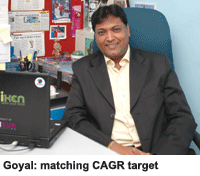 “Our R&D centres have developed excellent products, content and services for the schools sector. Our Iken School Ecosystem has been installed in over 100 schools countrywide, and our B2C products are available in all major education retail stores across the country. Now we are ready to scale our operations commer-cially. Micro Inks, one of our associate companies of the Bilakhia Group, has been recording a CAGR (compounded average growth rate) of 38 percent per annum for the past ten years. Our intent is to match this rate of growth,” says Anil Goyal a former chartered accountant who acquired valuable finance and project management experience in IDBI (1995-2000), the SKIL Group which built the Piparav Port in Gujarat (2000-05), and the infrastructure finance behemoth IL&FS (2005-2008) prior to signing with ME as finance director and chief operating officer.
“Our R&D centres have developed excellent products, content and services for the schools sector. Our Iken School Ecosystem has been installed in over 100 schools countrywide, and our B2C products are available in all major education retail stores across the country. Now we are ready to scale our operations commer-cially. Micro Inks, one of our associate companies of the Bilakhia Group, has been recording a CAGR (compounded average growth rate) of 38 percent per annum for the past ten years. Our intent is to match this rate of growth,” says Anil Goyal a former chartered accountant who acquired valuable finance and project management experience in IDBI (1995-2000), the SKIL Group which built the Piparav Port in Gujarat (2000-05), and the infrastructure finance behemoth IL&FS (2005-2008) prior to signing with ME as finance director and chief operating officer.
Certainly the future looks bright for this young company which has positioned itself as an end-to-end provider of in-school and supplem-entary education products and services. With Indian industry suffering an unprecedented shortage of skilled workers, the pressure on school (and college) managements to provide real rather than ritual education is intensifying to inflection point. The timely and well-conceptualised entry into this theatre of great expectations of the young Mexus professionals, who have recently experienced the infirmities and pains of the rapidly obsolescing K-12 school system, augurs well not only for the company, but for Indian education.